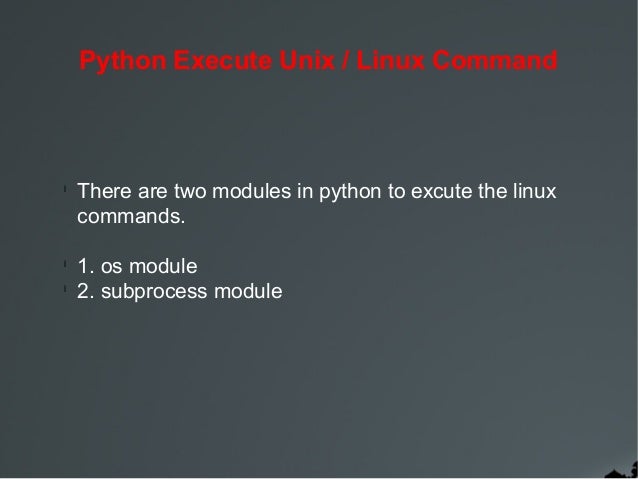
Download Subprocess Module Python
InterServer Real Time Malware Detection Real time suspected malware list as detected by InterServer's InterShield protection system. Aomei dynamic disk converter professional edition 3.5 crack. DNSRBL available at with lookups to rbl.interserver.net Stats Info on 88.99.2.89 Abuse DB ID 722236 First Seen 2017-12-26 03:16:16 Last Seen 2018-12-19 23:49:58 Reason 'mod_security' Total Servers 33 Total listings 106 Error: Your IP may be getting blocked by our IPS due to a known string of false positive. Complete the reCAPTCHA then submit the form to delist.
Delist Me Abuse DB ONLY.
Shell=True shell=False (the default) cmd type string: 'ls -l /etc/passwd' list: ['ls','-l','/etc/passwd'] When program not found returns non-zero exit code (usually 127). With check_call/ check_output will raise raise Advantages Simple to use; Allows shell expansion (e.g.
Ls /tmp/*.txt, $HOME) and complex pipe commands ( seq 10 rev tac 2>/dev/null) Safer,easier to use with problematic file names (e.g. With spaces or non-English characters); Avoids potential shell-related security issues; Disadvantages potential security issues, see shell-functionality (redirection, pipes, globbing, env-vars) requires extra python code; Basic Usage • The examples below show typical usage, with contrieved examples (there is rarely a real need to run ls -l from within python - better use module for such things) • The examples start with minimal error checking, then progress to complete code with proper error checking. Check_call Run the program ( ls), STDOUT/STDERR shared with the script’s (e.g. Will be printed to the terminal). From subprocess import call rc = call ([ 'grep', '-Eq', '(z k tc)sh', '/etc/passwd' ]) if rc == 0: print ( 'someone is using zsh/ksh/tcsh' ) elif rc == 1: print ( 'zsh/ksh/tcsh not used' ) else: print ( 'an error occured, grep returned% d'% rc ) If any error occurs, grep will print a message to STDERR, which will be sent to the same STDERR of the script’s (e.g. The screen) - the user will see it.
Subscribe to Download Java Design Patterns eBook You are here: Home » Python » Python System Command – os.system(), subprocess. We will use Python subprocess module to execute system commands. We can run shell commands by using subprocess.call() function. See the following code which is equivalent to the previous code. Nov 16, 2013 - The subprocess module extension to run processes. Subprocess.run 0.0.8. Pip install subprocess.run. Ps aux python script.py.
Popen enables fine-control over the external process - getting its STDOUT,STDERR and returned code. Snapper serial number lookup. In the example below out will contain the content of /etc/passwd, and err will contain an error message about /foo/bar not being found. The returned code will be 1.
From subprocess import Popen, PIPE p = Popen ([ 'cat', '/etc/passwd', '/foo/bar' ], stdout = PIPE, stderr = PIPE ) ( out, err ) = p. Communicate (); print ( 'cat returned code =% d'% p. Returncode ) print ( 'cat output: n n% s n n '% out ) print ( 'cat errors: n n% s n n '% err ) Error Checking check_output error checking (without shell expansion) The check_* functions will raise if a program fails (runs, but returns non-zero exit code), or if the program was not found. The following contrived example will randomly run seq 10, seqXX 10, seq foo, seqXX foo - thus generating different types of errors. From subprocess import check_output, CalledProcessError from random import choice import sys try: cmd = choice ( [ 'seq', 'seqXX' ] ) param = choice ( [ 'foo', '10' ] ) numbers = check_output ([ cmd, param ]) print ( '% s% s' succeeded, result=% s'% ( cmd, param, str ( numbers ))) except CalledProcessError as e: sys. Exit ( '% s% s' failed, returned code% d'% ( cmd, param, e.
Returncode )) except OSError as e: sys. Exit ( 'failed to execute program '% s': '% s'% ( cmd, str ( e ))) ( download ) check_output error checking (with shell expansion) The check_* functions will raise if a program fails (it runs, but returns non-zero exit code), or if the program is not found (and the return-code will be 127). Is unlikely but can still happen and should be accounted for. The following contrived example will randomly run seq 10, seqXX 10, seq foo, seqXX foo - thus generating different types of errors.

From subprocess import check_output, CalledProcessError from random import choice import sys try: prog = choice ( [ 'seq', 'seqXX' ] ) param = choice ( [ 'foo', '10' ] ) # WARNING: constructing shell commands without input validation # could lead to security issues! Cmd = '% s% s'% ( prog, param ) numbers = check_output ( cmd, shell = True ) print ( 'command '% s' succeeded, returned:% s'% ( cmd, str ( numbers ))) except CalledProcessError as e: if e. Returncode == 127: sys. Exit ( 'program '% s' not found'% ( prog )) elif e.